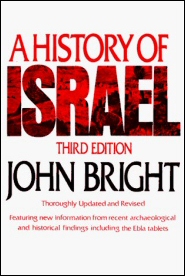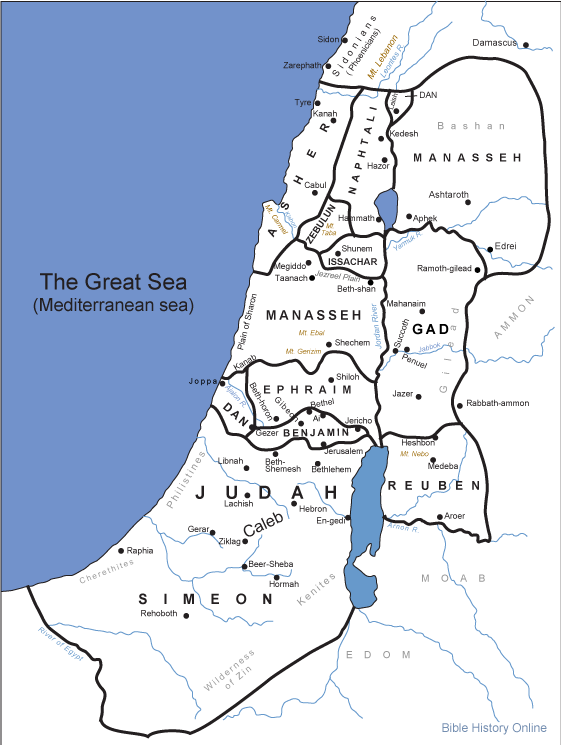 These thoughts are from A History of Israel by John Bright © 1972, 1981 The Westminster Press. Bright uses two words that need some clarification – cult and league. By cult he means “a particular system of religious worship, especially with reference to its rites and ceremonies.” He does not mean “a religion or sect considered to be false.” Since I’m a sports junkie the only definition for league I knew of to this point was “a group of athletic teams organized to promote mutual interests and to compete chiefly among themselves.” The definition can also include “a covenant or compact made between persons, parties, states, etc., for the promotion or maintenance of common interests or for mutual assistance or service.” Also, “an association of individuals having a common goal.”Here are Bright’s quotes regarding Israel’s tribes. Reflect on whether there are connections with building the kingdom of God.
These thoughts are from A History of Israel by John Bright © 1972, 1981 The Westminster Press. Bright uses two words that need some clarification – cult and league. By cult he means “a particular system of religious worship, especially with reference to its rites and ceremonies.” He does not mean “a religion or sect considered to be false.” Since I’m a sports junkie the only definition for league I knew of to this point was “a group of athletic teams organized to promote mutual interests and to compete chiefly among themselves.” The definition can also include “a covenant or compact made between persons, parties, states, etc., for the promotion or maintenance of common interests or for mutual assistance or service.” Also, “an association of individuals having a common goal.”Here are Bright’s quotes regarding Israel’s tribes. Reflect on whether there are connections with building the kingdom of God.
It was “within her tribal structure that Israel’s sacred traditions, beliefs, and institutions developed and achieved normative form.” (144)
What held them together was a covenant relationship with God. “According to the Bible, Israel responded to Yahweh’s favor by entering into covenant with him to be his people and to live in accordance with his commandments. It other words, it was through covenant that Israel was constituted as Yahweh’s people.” (149)
“The existence of Israel as a people thus rested in the memory of a common experience as handed down ultimately by those who participated in it, who were the nucleus of Israel.” (150)
 “From the beginning of her life in Palestine down to the rise of the monarchy, a period of some two hundred years, Israel existed as a loosely organized system of (traditionally twelve) tribes. Through all this period she had no central government or machinery of state.” Israel’s “tribal system persisted” and “provided the framework within which her sacred traditions and characteristic institutions achieved normative form.” (162)
“From the beginning of her life in Palestine down to the rise of the monarchy, a period of some two hundred years, Israel existed as a loosely organized system of (traditionally twelve) tribes. Through all this period she had no central government or machinery of state.” Israel’s “tribal system persisted” and “provided the framework within which her sacred traditions and characteristic institutions achieved normative form.” (162)
“Early Israel seems in fact to have existed as a sacral league of tribes founded in covenant with Yahweh… the Bible traces the descent of all the tribes to the ancestor Jacob (Israel).” (163)
“Individual tribes were again and again forced to take concerted action in times of common emergency. Such emergencies were frequent enough; and the memory of help given and received may have lingered for generations, and must have done much to strengthen feelings of closeness among the tribes immediately affected.” (164)
“The constant threat of common danger no doubt intensified Israel’s feeling of unity, but it cannot of itself have created it. Indeed, the twelfth-century Song of Deborah (Judg. Ch.5) tells us of one occasion when tribes that already had bonds of unity with those most immediately threatened, and were for this reason felt to be under obligation to send help, nevertheless failed to do so.” (164)
“Tribal society was patriarchal, and it lacked the stratification characteristic of the feudal society of Canaan. Though elders of the clans, by virtue of their position, adjudicated disputes in accordance with traditional procedure and were looked up to for the wisdom of their counsel, anything resembling organized government was lacking. The league had its focal point at the shrine shich housed the Ark of the Covenant, at least by the end of the period located at Shiloh. There the tribesmen would gather on stated occasions to seek the presence of Yahweh and renew their allegiance to him, and also to adjust matters of controversy and mutual interest among the tribes. Each tribe was presumably represented by its head, very probably the nasi, who by virtue of this position,, stood under especial divine protection (Ex. 22:28)
“The tribal system was probably not altogether unique. Though analogies with the Greek amphictyonies should not be pressed to far, tribal confederations of one sort or another were common in the world of the day, and had been for centuries.” (166)
“How the Israelite league operated may best be learned from the book of Judges. Here we see the tribes maintaining a precarious existence surrounded by foes, but without organized government of any sort. In times of danger there would arise a judge, a man empowered by ‘the Spirit of Yahweh’, who would call out the clans and repel the foe. Though Israel must have had some customary military organization, there was no standing army; battle strength rested solely on the rally of the clans. The clans could not be compelled to respond, but they were obligated to do so and were roundly cursed if they did not (Judg. 5:15-17; 23), for the call to arms was the call to fight the divine Overlord’s wars. Though his victories won him prestige, the judge was in no sense a king. His authority was neither absolute, nor permanent, nor in any case hereditary; it rested solely in those personal qualities of leadership (the charisma) that gave evidence to all that Yahweh’s Spirit was upon him. Indeed as Gideon’s brusque refusal of a crown (Judg. 8:22f) and Jotham’s biting fable (ch.9:7-21) show, the whole notion of monarchy was rejected as improper. The authority of the judge was of a type perfectly expressive of the faith and constitution of early Israel: the God-Kings direct rule over his people through his Spirit-designated representative.” (167)
“It is clear from the Song of Deborah (Judg. Ch.5) that the tribal league was in full operation, with at least ten members, in the twelfth century.” (167)
The focal point of the life of Israel “throughout its history was the shrine housing the Ark of the Covenant, the throne of the invisible Yahweh… The Pentateuchal sources refer to the desert shrine as ‘the Tent of Meeting’…where Yahweh met with his pepole and made known his will – or simply as ‘the Tent, the Tabernacle’… with stress upon the presence of Yahweh ‘tenting among his people.” (168-9)
But “the central shrine was not, to be sure, an exclusive one, for other shrines existed and were freely tolerated. Because of this fact, and because the Tabernacle is scarcely mentioned through the period of the Judges, it was once commonly assumed that Israel had no central cult at the time. This is scarcely correct. Not only were great pilgrim shrines the rule in most ancient Oriental countries, but Israel’s tribal organization – as was true of similar organizations elsewhere – required a focal point at a central sanctuary. Though worship at other places was not excluded, the shrine of the Ark was the official shrine of the tribal league and the heart of its corporate life.” (169)
“Early Israel’s cult, however, did not center in a sacrificial system, but in certain great annual feasts.” (171)
“Regarding actual judicial procedure, we may assume that justice was normally dispensed by the village elders in accordance with tradition. The priests were called on to settle hard cases by oracle or by ordeal (cf. Num. 5:11-31; Deut. 17:8-11)…Many have believed that the so-called Minor Judges (Judg. 10:1-5; 12:7-15) were officials of the league whose function it was to administer the law for all Israel and to adjucate cases of controversy between the tribes.” (173)
